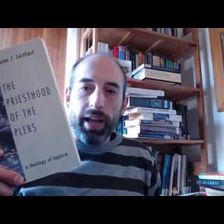Q&A#82 Richard Rohr on Scripture

Today's question:
" I came across this post from Richard Rohr on how Jesus interpreted scripture (https://cac.org/jesus-interpreted-scripture-2017-01-10/). Here is a quote from the post:
'Jesus consistently ignored or even denied exclusionary, punitive, and triumphalistic texts in his own inspired Hebrew Bible in favor of passages that emphasized inclusion, mercy, and honesty. He read the Scriptures in a spiritual and selective way. Jesus had a deeper and wider eye that knew which passages were creating a path for God and which passages were merely cultural, self-serving, and legalistic additions. That becomes self-evident once you know enough to see the “comparative meaning” of an incident or statement.
When Christians pretend that every line in the Bible is of equal importance and inspiration, they are being very unlike Jesus. This is precisely why Jesus was accused of teaching “as one who had authority, and not as their scribes” (Matthew 7:29, RSV), and why they hated him so much. Jesus even accused fervent and pious “teachers of the law” of largely missing the point. “Is not this why you are wrong, that you know neither the Scriptures nor the power of God?” he asked them (Mark 12:24, RSV). We cannot make the same mistake all over again—and now in Jesus’ name.'
How would you respond to the idea that Jesus read the scripture in a spiritual and selective way and that he emphasized some while ignoring or denying others?"
If you have any questions, you can leave them on my Curious Cat account: https://curiouscat.me/zugzwanged.
If you have enjoyed these talks, please tell your friends and consider supporting me on Patreon: https://www.patreon.com/zugzwanged.
The audio of all of my videos is available on my Soundcloud account: https://soundcloud.com/alastairadversaria. You can also listen to the audio of these episodes on iTunes: https://itunes.apple.com/gb/podcast/alastairs-adversaria/id1416351035?mt=2.
More From Alastair Roberts






More on OpenTheo















